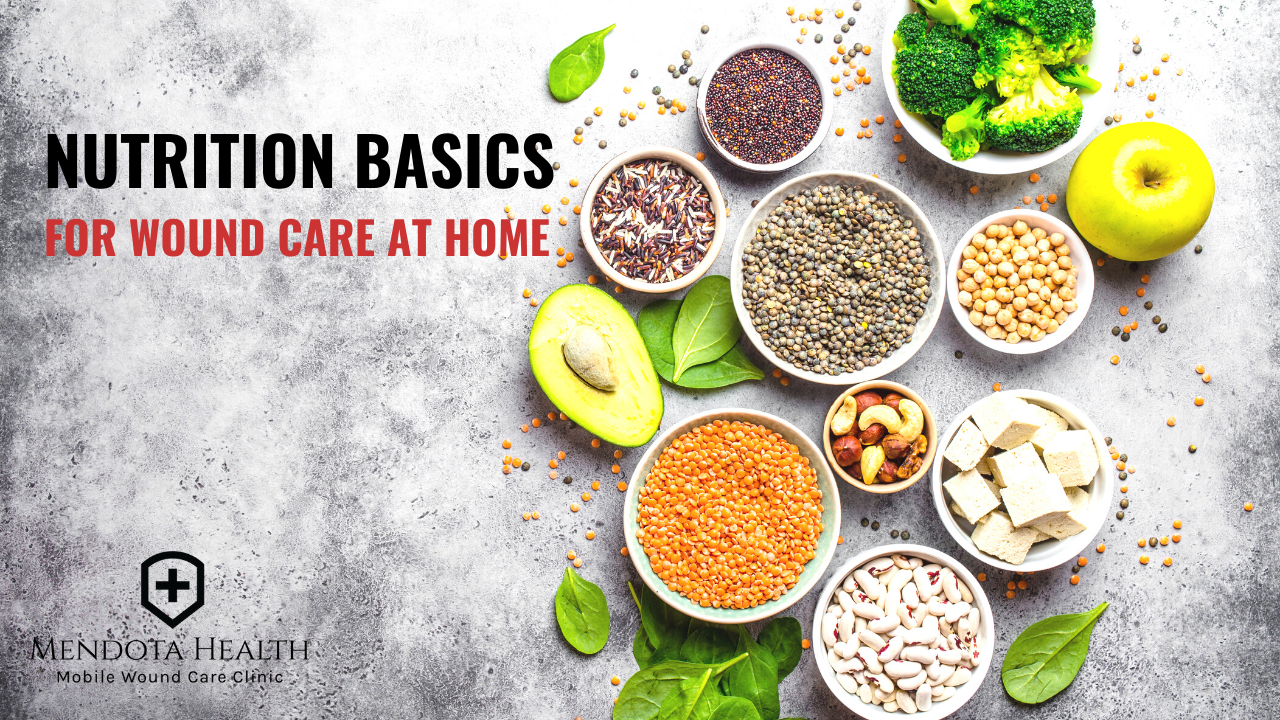
13 Oct NUTRITION BASICS FOR WOUND CARE AT HOME
It is widely known that nutrition is an important component of wound healing. People with chronic wounds are more likely to have nutrient deficiencies than those without chronic wounds. The wound healing process requires a great deal of energy and nutrients to carry out many complex physiologic processes. More research is needed on the exact role for various nutrients, vitamins, and minerals and nutritional supplementation in the management of chronic wounds. If you understand some nutrition basics you can make a big difference on your own wound healing. Good nutrition should be part of your wound care at home routine!
WOUND HEALING PROCESS
The steps of the wound healing process involve coagulation, inflammation, migration/proliferation, and remodeling. In acute wounds, these phases occur in linear progression with some overlap. However, in chronic wounds the phases may exist simultaneously, or different areas of the wound may be in different phases. Often the wound gets stalled in one or more phases of the process due to the presence of comorbid conditions, immunosuppression, medication, or other external factors. Each phase of the wound healing process is supported by a complex combination of nutrients.
Each phase of the wound healing process is supported by a complex combination of nutrients.
PROTEIN
The wound healing process greatly increases the need for protein and other metabolic demands. Additionally, large amounts of protein may be continuously lost through wound exudates. Protein requirements may rise by as much as 250% in patients with a chronic wound and is required for immune response, angiogenesis, and collagen-formation. Patients with chronic wounds should be sure to incorporate protein at every meal, such as lean meats, eggs, beans, or legumes. Protein powders and shakes can also be a great option for people that struggle to intake enough protein.
OTHER MACRONUTRIENTS
Carbohydrates are the main source of energy for the body and help sustain the high metabolic activity required for regeneration. Fats provide energy for proliferation and are important for cell membrane synthesis. It is essential that wound patients eat a balanced diet with adequate amounts of carbohydrates and fats to support the wound healing process.
VITAMIN A
Vitamin A can be found in green leafy vegetables, orange and yellow vegetables (carrots, squash, sweet potatoes), cantaloupe, and mango, among others. Vitamin A is important in the inflammatory phase of wound healing, a common phase in which chronic wounds get “stuck.” Vitamin A is important for the development of a key protein in the extra-cellular matrix, called collagen, which can reduce inflammatory cells and the wound bed and encourage remodeling. Additionally. Vitamin A is important for the process of re-epithelialization.
VITAMIN C
Vitamin C is also important for collagen synthesis, and can be found in citrus fruits, bell peppers, strawberries, and tomatoes. It is also important for immune function by aiding in creating white blood cells to fight infection and utilizing oxygen free radicals to kill bacteria.
ZINC
Zinc is a cofactor for at least 70 major enzyme processes important in wound healing. Additionally, zinc aids in the mobilization of Vitamins A and C. Oysters are the best source of zinc, but the mineral can also be found in red meat and poultry.
GOOD NUTRITION IS ESSENTIAL
When planning your wound care at home routine, make sure it includes a balanced diet. Focus on getting plenty of protein as a great place to start when it comes to using nutrition to support your body’s wound healing process. If you continue to have a stalled chronic wound, speak to your health care provider or a dietician to help you identify areas for additional nutritional support or supplementation. Good nutrition is essential for living a life full of vitality!
Check out our locations map to see if our mobile advanced wound care clinic is operating in your area.

